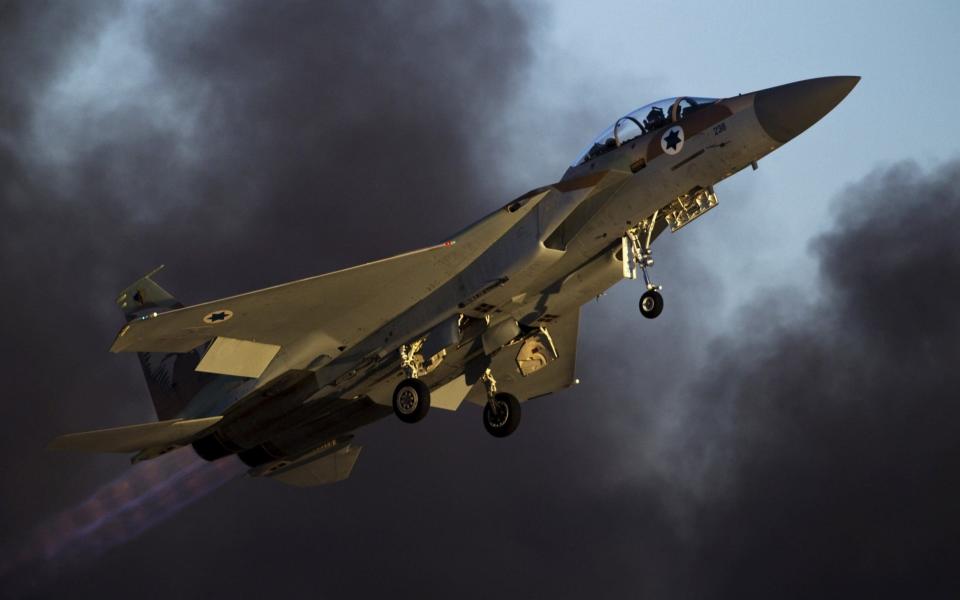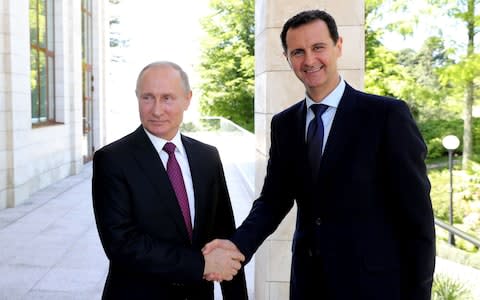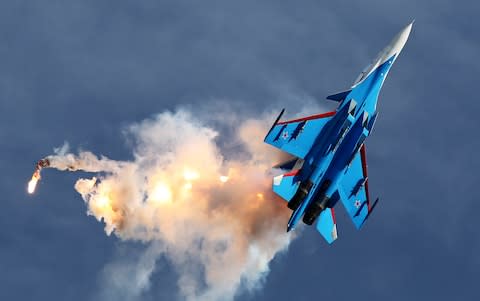Israel sees an opportunity to drive a wedge between Iran and Russia in Syria

Israel is increasingly optimistic that it may be coming close to its longheld goal of driving a wedge between Russia and Iran in Syria, a senior Israeli official said today.
Chagai Tzuriel, director general of the Israeli intelligence ministry, said he believed Russia was growing frustrated with Iran's presence in Syria and was worried that fighting between Israel and Iran would threaten Moscow's interests.
"My assessment is that the Russians are interested in stabilising their achievements in Syria," Mr Tzuriel said. "I think they understand that if the Iranians continue on the present course this will lead to escalation and will blow their plans out of the water.”
Israel’s has long said it would not allow Iran to gain a permanent military foothold in Syria. Israeli forces have carried out increasingly intense strikes against Iranian targets in Syria in recent weeks and in the process have inflicted serious damage on the Assad regime’s air defences.
Mr Tzuriel said he believed that the Israeli strikes - combined with America’s withdrawal from the Iran nuclear agreement and economic discontent within Iran - were fueling tensions between Iran and its Russian and Syrian allies.
“I think this is a moment pregnant with opportunity. My assessment is that the situation we’re in is an opportune moment to try to change fundamentally the strategic situation,” he said.

Mr Tzuriel spoke as unconfirmed reports emerged that the Syrian regime’s air force was trying to expel Iranian troops from its airbases because they were such a frequent target of Israeli attacks.
Zaman Al Wasl, a Syrian opposition media outlet, said Syrian air force commanders were trying to shut Iranian troops and Hizbollah fighters out of their air bases to try to shield the sites from Israeli strikes.
Potential cracks in the Russian-Iranian relationship have become increasingly visible in recent weeks.
Vladimir Putin, the Russian president, said in mid-May that all foreign forces would leave Syria once the Assad regime was fully in control of the country. The comments appeared to anger Iran. An Iranian foreign ministry spokesman said in response: “No one can make Iran do things; Iran has its own independent policies.”
Sergei Lavrov, Russia’s foreign minister, also said Monday that only Syrian regime forces should be stationed on Syria’s southern border - implying that neither Iran nor Hizbollah should be allowed near the Israeli border.
The comment appeared to be another small victory for Israel, which has long urged Russia in rein in Iran’s presence all across Syria but especially in the south near the Israeli border.

Michael Horowitz, a senior analyst at the Le Beck geopolitical consultancy, said Israel had been trying for a long time to warn Russia about the dangers of Iran’s presence in Syria but had only recently gained traction.
“The Israeli strategy was always to convince Russia that they had a lot to lose if they didn’t do anything about Iran. Until a few weeks ago, I would have told you they were doing that in vain and that Russia didn’t understand and didn’t care. But it’s changed because the escalatory strategy of Israeli strikes in Syria is really threatening to trigger conflict,” he said.
Video: Why Israel Is Attacking Iran in Syria
For more news videos visit Yahoo View.
Mr Horowitz cautioned that the recent shift did not mean Israel would necessarily achieve its goal of forcing Iran out of Syria. “This doesn’t mean Israel has won. But it means the dynamics are changing for the first time.”
Even if Russia and the Syrian regime do believe that Iran’s presence is coming at too high a price, it is not clear how they could force Iranian troops and their Shia militias allies out of Syria.
Iran has invested heavily in propping up the Assad regime during years of fighting and is not likely to give up its presence easily. Assad’s battered forces are also still heavily dependent on Iranian-controlled militias as they try to conquer the remaining pockets of rebel-held territory in Syria.

“Assad and the Russians still need the Shia militias to help them finish off what they have started Syria,” said Mr Tzuriel, the Israeli official. “That is part of the consideration and there is an issue of timing here. But that does not change my basic assessment that at the end of the day there is an opportunity now.”
The US expressed alarm over the weekend that Syrian regime forces were massing for an assault on a rebel-held area in the southwest of the country, near the border with Jordan and the Israeli-occupied Golan Heights.
The area is part of a “de-escalation zone” where both Assad’s forces and rebel fighters are supposed to be observing a ceasefire. The agreement on the de-escalation zones were made last year between the US, Russia and Jordan.
Regime forces have launched attacks in de-escalation zones in other parts of Syria and met little protest from the US. But the southwestern zone is acutely sensitive because of its proximity to Jordan and Israel, both US allies.
The US warned that it would take “firm and appropriate measures” if Assad’s forces moved forward with the offensive. The Syrian regime has so far signaled it intends to move forward with the assault, despite American warnings.

